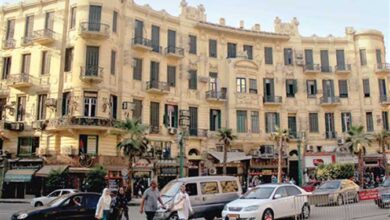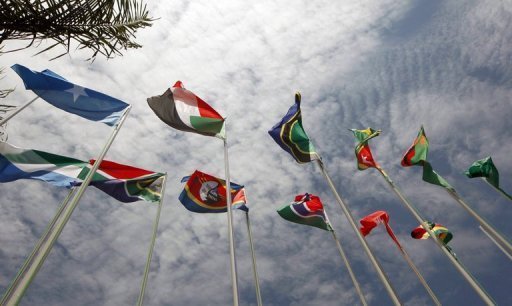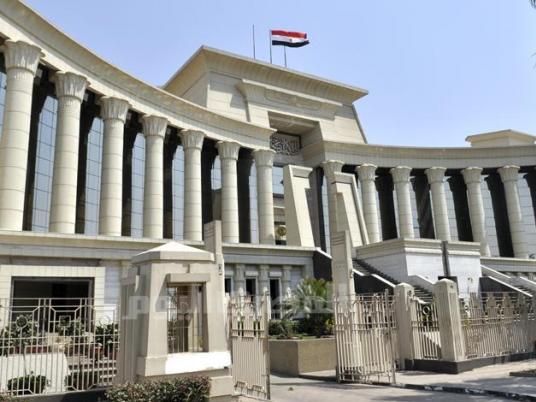Outside a courthouse built to resemble an ancient Egyptian sun temple, a group of protestors chants against their “Pharaoh.” Cairo’s Supreme Constitutional Court is scheduled to announce today its ruling in two highly contentious cases, determining the legality — or lack thereof — of the election laws outlining the formation of the Shura Council currently in session, as well as that of the assembly responsible for drafting the constitution recently passed through referendum.
As a result, opposition members gathered outside the courthouse amid heavy state-security presence, in an effort to “support the judiciary in its struggle against Brotherhood besiegement,” and call for the ouster of President Mohamed Morsy.
Gesturing out over a crowd of approximately 200 protestors, Nadia Nour al-Din explains why the morning’s crowd seems to be “mostly made of women.” According to the unemployed mother of three, “We [women] are the ones who have been suffering the most, and we’ll continue to suffer the most under this new constitution.”
“How many Shura Council seats are held by women,” she asks, before answering, “less than a quarter. And they’re all wives of high-ranking Brotherhood figures.”
Omnia Nagy Selim, an English teacher, overhears the claim and rushes to add to it. “We support the law, and that’s why we’re here. Hazem and his kids come down [to this court] with their swords and knives, terrorizing the judges,” she says, referring to controversial Salafi cleric Hazem Salah Abu Ismail and his followers — a group of militant youth operating under the name "Hazemoun" — “and they sic their thugs on normal citizens. They’re trying to dismantle the state, and we’re here to stop them.”
“Morsy wants me to live on the street,” Zuzu Hussein, an elderly, well-dressed, veiled woman chimes in. “I’m a widow without children and I’ve been turned away by the Housing Ministry. Because I have no kids to provide for, I’m not entitled to anything according to this new Constitution.”
The three women then turn back to the larger group, and chant along “Hold your head high, you’re Egyptian” — a formerly inspiring call from the earlier days of the revolution, now twisted into sarcasm by an added verse — “Your president is a jailbird, and his name is Morsy.”
As the chants continue the crowd slowly swells, eventually taken over by the men, while the majority of the women reorganize themselves behind a wide banner that reads, in English, “Morsy failed to protect the court, we will.” Across the street a smaller group of women stands huddled on the lane divider carrying similar signs in Arabic and, past them, the courthouse, lined with state-security officers.
Walking alongside the larger crowd and asking its members to stay on the sidewalk so as not to obstruct traffic, Secretary of Media for the opposition Tagammu Party Fathy Mohamed Sayed voices his concern to Egypt Independent. “The Brotherhood doesn’t know what it’s doing. It’s just following its own personal interests along a path set for it by the United States and Israeli governments. They’re not smart enough to think ahead and see that we’ll all be in the same hole together. And it’ll be bottomless.”
“This country,” he says, “stood on three legs: the army, state security, and the judiciary. Two have been yanked out from under us; if the Brotherhood amputates the judiciary as well, then we will never be able to move forward as a country. We will not be country anymore. We will have become the farm that the Brotherhood seems so desperate to run.”
Also attempting to organize the crowd, and among the first to call for order when things got chaotic soon afterwards, Maher Abdel Hakim points out why it’s fair to look at the ruling regime’s decrees as a “besiegement” of the nation’s defining institutions, most recently the judiciary.
“By making the [Constituent] Assembly and the Shura [Council] immune to dissolution, by knocking down the number of judges from 18 to 11 so as to weed out the slightest hint of opposition, [Morsy] has neutered the very notion of democracy,” the 54-year-old hotelier, who claims no allegiance to anything but the “revolution,” states. When asked about his expectations on the impending court ruling, Abdel Hakim is the first of the day’s interviewees to answer, “Absolutely nothing.”
“They [the SCC] won’t rule in the country’s favor, they’re too scared to stand up to Morsy.” He expresses further lack of faith in SCC chairman Maher al-Beheiry before reminding Egypt Independent that “the [Shura] Council is formed and the Constitution is already passed.”
Throughout the morning, rumors of Morsy’s planned visit to the victims of early Tuesday’s tragic Badrashin train wreck at the Maadi Military Hospital directly adjacent to the courthouse agitated the protestors, with many suggesting they block the road prior to his arrival, and some going as far as to propose an outright attack on the presidential convoy. For the most part, the rumors were dismissed as such.
When the convoy did, in fact, appear, the protestors reacted with rapid escalation, first hurling obscenities at the procession of vehicles, and then holding up their footwear at it. When an 18-wheeler moving alongside the convoy slowed as it passed the protestors in order to block their view of the convoy, the group broke apart: some protestors chased after the speeding convoy, while others gathered around the truck, banging on its sides and laying their bodies down in front of it.
“To the hospital!” several man began to call, and a larger number obeyed, rushing towards the building, and the cordon of state security forces bunching shut after letting the convoy through. There was a spark of a clash as the younger of the protestors threw themselves up against the cordon, quickly put out by older men and commanding police officers. One protestor in a galabeya was seen by this reporter swinging a heavy iron chain and directly threatening state security members, to much admonishment from his peers. Around the truck, the scene ranged from wailing women planting themselves on the asphalt and refusing to leave until “the martyrs’ rights” were secured to teenage boys hoisting themselves on each other’s shoulders and adult men clapping in rhythm, one of whom responded to this reporter’s suggestion to get off the street with a smile and the justification “five more minutes. We’ve earned it.”
The joviality subsided faster than the anger, and once the most forceful of the protestors had been coaxed back onto the sidewalk, the chanting resumed, albeit with a more audible ferocity.
“This is it, people,” one man was heard shouting. “If we don’t win over them on this 25 [January], we’ve lost everything. The revolutionaries will be deemed traitors and they [the Brotherhood] will come after all of us.”
Offering an even clearer ultimatum, Hamdy Ibrahim Mohamed, a Mahalla resident who says he has been living in Tahrir Square for the past four months, reiterates, “The Brotherhood and the Salafis have both said they will not be participating in the upcoming 25 January protests. This is not for the population’s benefit; it’s so that the Brotherhood can infiltrate crowds and then blame it on a third party.”
“To which I say enough of this third party bullshit,” he continues. “I say that, should a single drop of blood be shed by a single protestor on this 25th, we will find the members of the Muslim Brotherhood. We will drag them from their homes. We will slaughter them, and their children. We know who the real traitors are. We will slit their throats.”
“Egypt,” he says, “is not a lawless country.”
Minutes later, the president leaves the hospital, this time in a helicopter.



